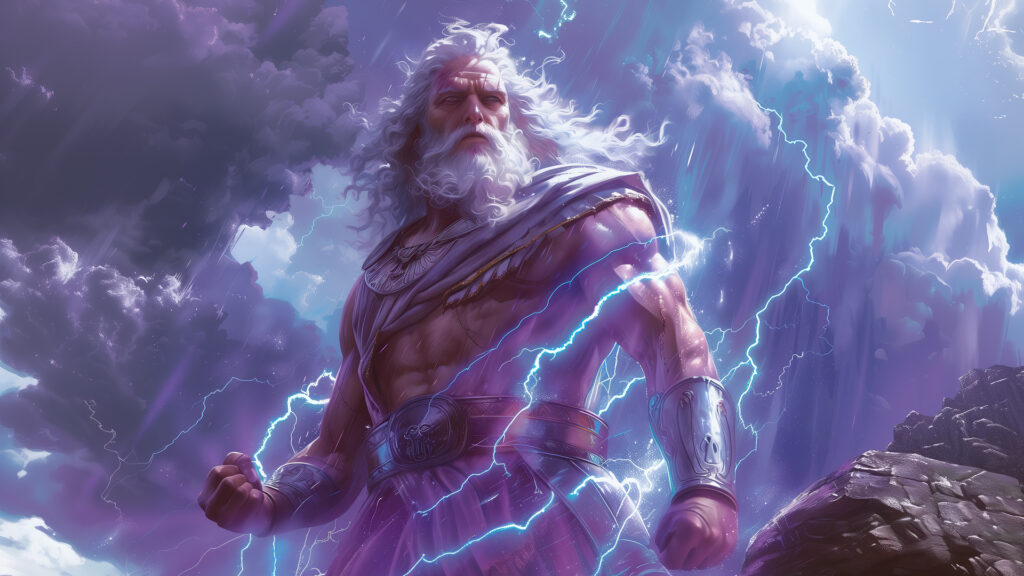Introduction
Zeus is one of the most important figures in Greek mythology, known as the king of the gods. His story is filled with adventure, power, and family drama. Born to the Titans Cronus and Rhea, Zeus had a challenging start, but he grew up to become a mighty ruler of Mount Olympus. In this article, we’ll explore Zeus’s early life, his epic battles, his role in the world, and his complicated relationships with his family. Let’s dive into the fascinating world of Zeus!
Birth and Early Life
Zeus was born to Cronus and Rhea, the Titans who ruled before the Olympian gods. Cronus, afraid of a prophecy that said one of his children would overthrow him, swallowed each of his kids as soon as they were born. Rhea, heartbroken over losing her children, saved Zeus by hiding him on the island of Crete. She wrapped a stone in blankets and gave it to Cronus, tricking him into thinking it was the newborn Zeus.
As Zeus grew up on Crete, he was cared for by the nymphs Adrasteia and Ida, who fed him honey and milk. When he became old enough, he decided to rescue his siblings. With the help of Metis, a wise goddess, he made Cronus vomit up his brothers and sisters: Poseidon, Hades, Hera, Demeter, and Hestia.
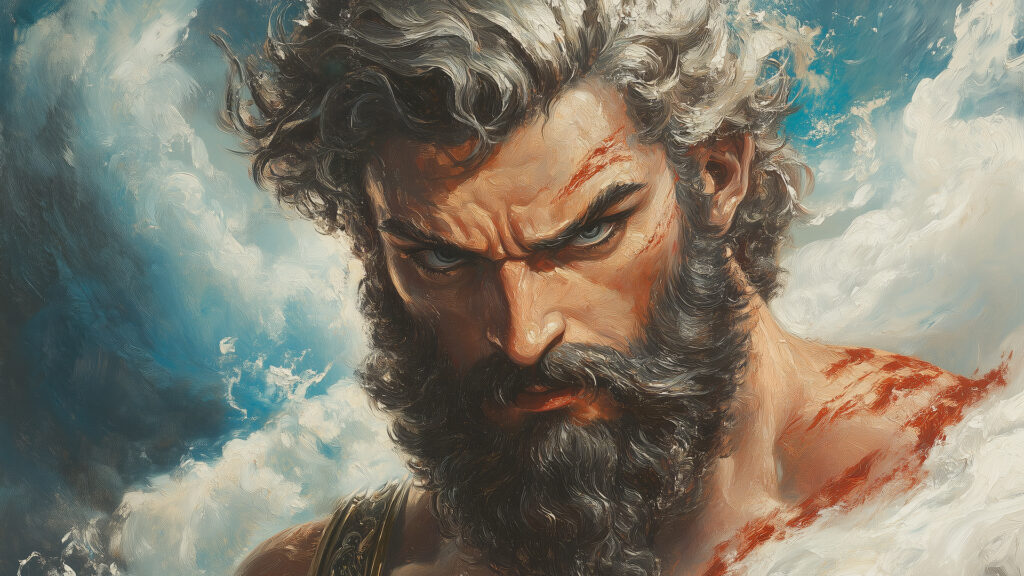
Titanomachy (Battle of the Titans)
After rescuing his siblings, Zeus gathered them to confront Cronus and the Titans in a fierce battle known as the Titanomachy. The term Titanomachy literally means “battle of the Titans,” combining the Greek word “Titan,” which refers to the Titans, and “machia,” meaning “battle” or “fight.” With help from the Cyclopes, one-eyed giants known for their immense strength and craftsmanship, and the Hecatoncheires, giant beings with a hundred arms, Zeus and his siblings fought against their father and the Titans. The Cyclopes provided Zeus with his famous thunderbolt, a powerful weapon that allowed him to strike down enemies with great force. The Hecatoncheires, with their many arms, fought fiercely on the battlefield, hurling massive boulders and attacking multiple foes at once. Together, these allies played crucial roles in the overthrow of Cronus and the Titans.
After ten long years of war, Zeus and his allies emerged victorious, overthrowing Cronus and the Titans. The defeated Titans were cast into Tartarus, a deep abyss used as a dungeon of torment and suffering. Tartarus was located far beneath the earth and was considered a place of punishment for the wicked. It was guarded by the Hecatoncheires, ensuring that the Titans could not escape. This imprisonment marked the end of the Titans’ reign.
After their big victory, Zeus became the king of the gods and ruled from Mount Olympus, watching over the sky. Poseidon took control of the sea, while Hades became the lord of the Underworld. Hera was named the queen of the gods, taking care of marriage and family. Hestia was the goddess of the hearth, representing home and warmth, and Demeter looked after farming as the goddess of the harvest. The new order of the Olympian gods secured their rule over both the heavens and the earth, keeping the balance of power firmly in their hands.
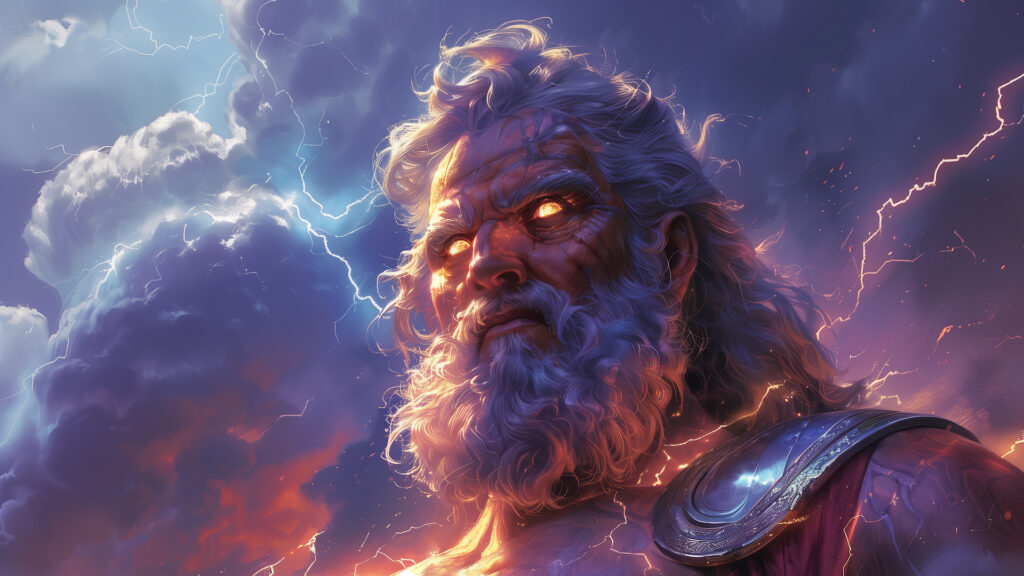
Zeus’s Role in Greek Mythology
Zeus is the king of the gods in Greek mythology and is known for controlling the sky and thunder. He lived on Mount Olympus, the tallest mountain in Greece, and carried a powerful lightning bolt that demonstrated his strength. As the ruler of the gods, he wanted to keep things fair among both gods and humans. Zeus often stepped in to help solve problems and showed that he was a protector who cared for both gods and people.
People worshipped Zeus in many ways and believed he controlled the weather. They built grand temples in his honor, like the famous Temple of Zeus at Olympia, which had a huge statue made of gold and ivory that was one of the Seven Wonders of the Ancient World. Festivals like the Olympic Games celebrated Zeus with sports competitions and sacrifices as people prayed for good weather, safety, and success.
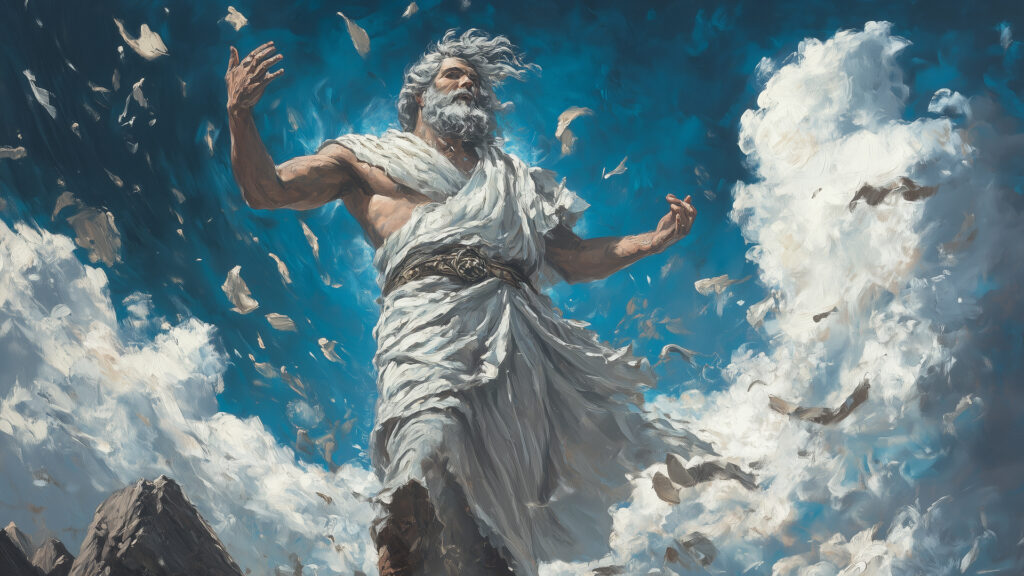
Zeus and His Divine Family
Zeus is one of the children of the Titans Cronus and Rhea. His siblings are Poseidon, the god of the sea, Hades, the lord of the Underworld, Hera, the goddess of marriage who became his wife, Demeter, the goddess of agriculture, and Hestia, the goddess of the hearth.
Zeus’s relationship with Hera was complicated because he had many affairs with other goddesses and mortal women. This fueled Hera’s jealousy and often drove her to seek revenge against Zeus’s lovers and their children. As the goddess of marriage, she took her role seriously, and Zeus’s betrayals threatened the very institution she protected. This added to the complexity of her feelings, as she was both hurt by his actions and committed to upholding the sanctity of marriage. Together, Zeus and Hera had several children, including Ares, the god of war, and Hebe, the goddess of youth.
In addition to his marriage, Zeus had many romantic adventures. One important relationship was with Leto, a Titaness, who became the mother of the twin gods Apollo and Artemis. Apollo is known as the god of the sun and music, while Artemis is the goddess of the hunt. Zeus also had a relationship with Maia, one of the Pleiades, who were seven sisters and the daughters of the Titan Atlas and the ocean nymph Pleione. Maia gave birth to Hermes, the clever messenger god who is fast and good at delivering messages. Zeus also tricked a woman named Alcmene into thinking he was her husband, which led to the birth of Heracles (Hercules), a famous hero known for his strength and bravery. He also had a son named Dionysus with a mortal woman named Semele. Sadly, Semele died after seeing Zeus in his true form, which was too much for her. Overall, Zeus is believed to have had around 50 to over 100 children.
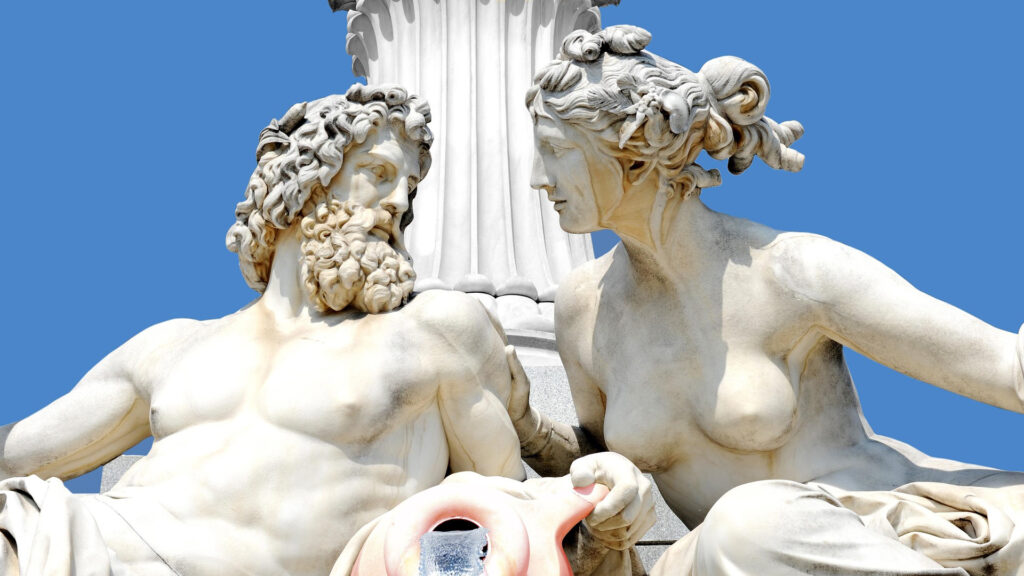
Conclusion
Zeus’s journey from a hidden child to the powerful king of the gods is filled with excitement and lessons about family and responsibility. His control over the sky and thunder, along with his many adventures, make him a captivating character in Greek mythology. What do you find most interesting about Zeus and his stories? Share your thoughts in the comments below!


